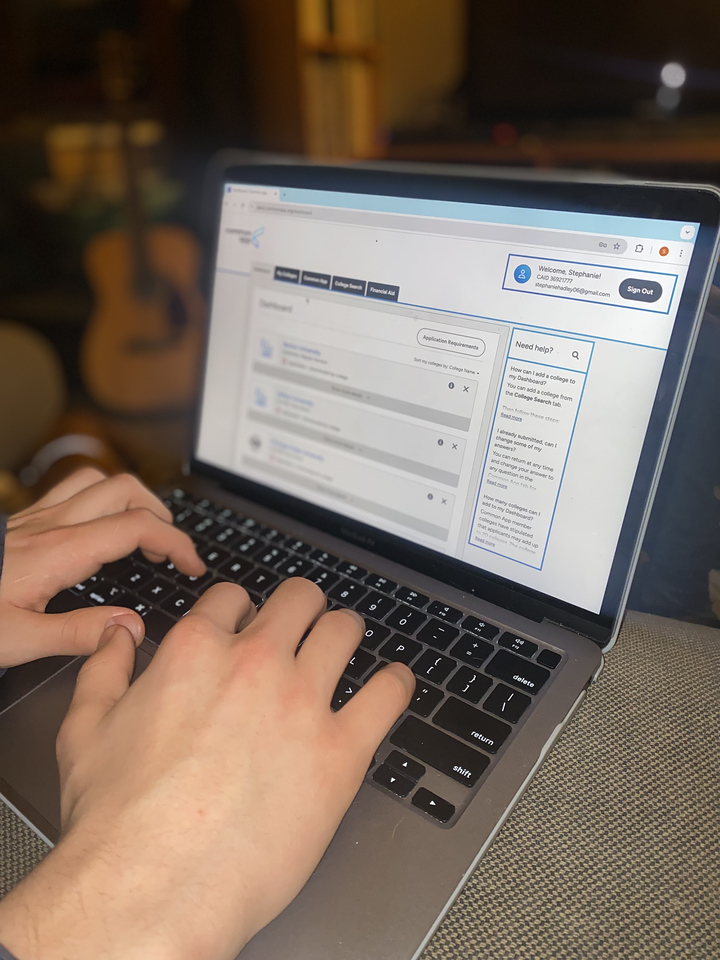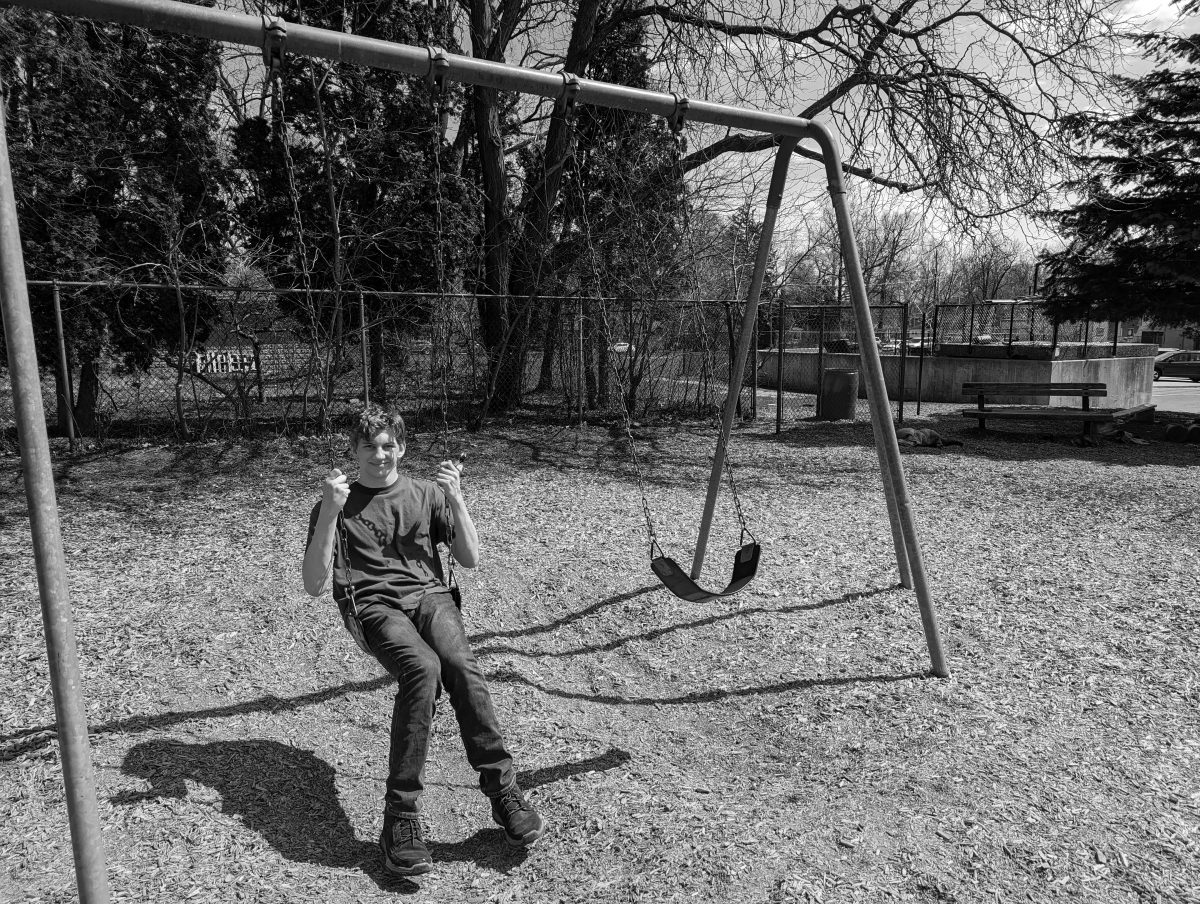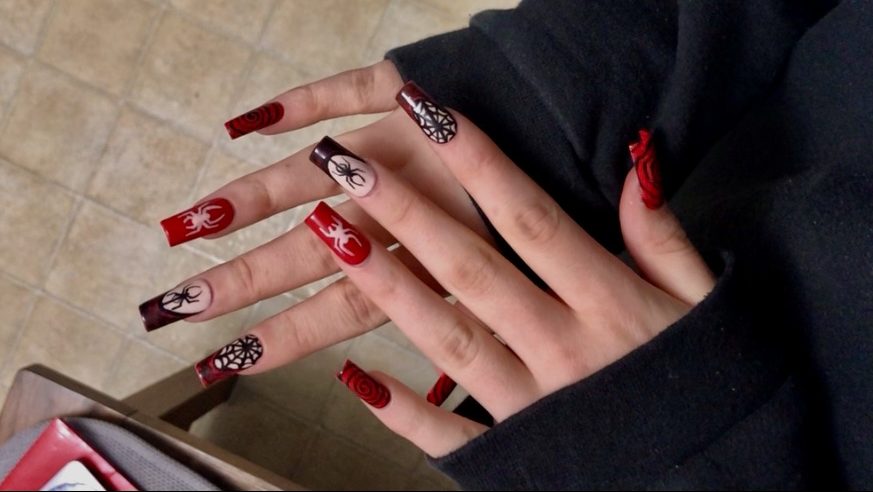Let’s go back to the end of December for a minute. It’s dark and cold. University of Michigan has promised to release its decisions for early action admissions, and Ann Arbor seniors are repeatedly checking their emails, biting fingernails and pulling at hair, waiting for the words “University of Michigan” to appear in their inboxes.
Once the emails arrive, no one has to wait long to find out who got accepted. Facebook news feeds fill with status after status celebrating acceptance after acceptance, plus the occasional admitted rejection. Seniors find the admissions decisions of their friends right in front of their faces.
The college acceptance dilemma—to post or not to post?—is just one facet of the multidimensional world of Facebook. As Facebook becomes more prominent in the lives of teenagers, it becomes increasingly common to see posts celebrating personal accomplishments, from college acceptances to sports championships to test scores. And as Facebook becomes a natural teenage activity, it begins to play a role in teenage self-esteem.
A recent study at Utah Valley University, which interviewed 425 students, found that the more people use Facebook, the worse they feel about themselves. Because of all the pictures of people smiling and having fun, Facebook often gives teenagers the illusion that they are not as happy as their friends.
Dr. Brenda Lepisto, an East Lansing clinical psychologist with an interest in the effect of technology on teenagers, explained that there are also studies that say that social media can help improve self-esteem, contradicting the Utah Valley findings. She believes that Facebook’s effects can vary: “It’s kind of different strokes for different folks. Different people feel differently about it. I’ve seen [Facebook] improve people’s self-esteem, I’ve seen it break up relationships, marriages, and I’ve seen people feel pretty left out, cyberbullied to some extent.”
ACCOMPLISHMENT AVENUE
Dr. Lepisto explained that Facebook can feel like the ideal environment for posting accomplishments: “It is a way to communicate with a lot of people, and I think that when someone is proud of something or wants to share something or wants to portray a certain image, then putting that on Facebook reaches a lot of people.”
Community High School senior Senait Dafa can understand why her classmates choose to post about college acceptances on Facebook. “When you get that letter in the mail, that moment’s like, ‘I made it, the past three and a half years of high school are actually worth something.’ That moment’s…so fantastic and I want to tell everyone I know,” she said.
Dafa, however, chooses not to post about her own acceptances and accomplishments. She believes that such posts serve to create jealousy. “I know of people who were rejected from U of M in the first enrollment process when early action admissions were released and people who really deserved…to get in didn’t get in, and I felt really bad. Because it’s all over Facebook,” she explained. “I don’t want to be known as someone who got into ‘this school, this school, this school, this school, this school.’ It’s just not me.”
Dr. Lepisto explained that other people’s Facebook posts can often be intimidating because they don’t show all sides of the issue. “Facebook shows one face of a situation. It doesn’t show reality. It doesn’t show the rejections that that person got. That person may have wanted to go to Harvard, or Stanford…and so what you see is not necessarily the total picture of how someone feels about getting into Michigan,” she said.
CHS senior Murphy Austin believes that posting about certain kinds of accomplishments is different than posting about others. He thinks that the nature of the college admissions process makes it normal to share. “I feel like it’s more communal…people are happy when other people get into colleges. So I feel like that’s more of a positive thing to say, like ‘I’m going to U of M, so happy and excited for next year!’”
Austin is less forgiving when it comes to posts about test scores. It can be hard for him to read them when he studied hard for a test but didn’t do as well as the poster. “I feel like it’s kind of unnecessary because there’s no real reason to put on your Facebook that you got a good score on a test other than that others will see it and think that you’re smart or think you’re accomplished, rather than [you] just being happy with what you got,” he said.
However, such posts can, as expected, improve the self-esteem of the poster. “I can imagine, if you get some pretty positive feedback about it, which most people do….it is meaningful for some people, I think maybe more so for teenagers,” said Dr. Lepisto. “I think for some people it’s a good thing, they enjoy it, they get a lot of positive feedback, it leads them to improve their feelings about themselves.” But she added that “for other people it has exactly the opposite effect. They feel like they’re the only person who didn’t get in their first choice, or didn’t get into a prestigious school or something like that.”
CHS freshman Sarah McCurrach doesn’t see a problem with posts about accomplishments on Facebook as long as it is done tastefully. “Facebook is kind of like a profile of your life, so what’s the point of having one if you’re not going to talk about your life? People follow you… I have friends who live in Boston; I’d love to hear when they’ve done well on something,” she said.
PICTURE PERFECT
Posts about accomplishments, however, are not the only way that Facebook users promote themselves. The opportunity to upload photos to Facebook and “like” others’ photos leads to competition among teenagers as to who can post the most attractive photo and gain the most “likes.” Teens often edit the pictures before posting.
McCurrach said that she sometimes competes with friends to gain “likes” on photos, but that it’s just for fun, isn’t taken seriously, and “doesn’t matter in the long run.” However, she said that getting a lot of “likes” on a photo can improve her self-esteem. She thinks this is true for girls more than it is for boys. It frustrates her when people take the issue of Facebook “likes” too seriously.
CHS sophomore Abby Lauer harbors a similar sentiment. She gets a negative feeling when people post heavily edited pictures on Facebook. “You don’t really see the real them, it’s just a fake picture of themselves, and then they just get a million likes and then they feel really good about themselves but you just feel like, ‘What is going on with this girl?’” said Lauer. She added that even the edited, unrealistic photos can spark jealousy. “It’s probably not even real and they are probably actually a really nice person, but you just see the picture and the likes and you’re like, ‘Oh, I want that,’”she said.
A wider example of teens using Facebook to validate physical appearance comes with the “Most Beautiful Teen Contest” pages that surfaced recently. These competitions have teens post their most attractive pictures to the contest page to be judged. This often leads to teens posting suggestive pictures, and rude or creepy comments are common on the photos. One of the most prominent competitions made headlines when Facebook shut it down after a parent expressed concern. However, many similar pages still exist, continuing to invite teens to open themselves up to hurtful or objectifying comments.
Dr. Lepisto said that in addition to competing for the most attractive pictures, teens commonly post pictures of themselves partying with friends. “[People post] drinking and partying activities because people tend to post how much fun you’re having, and then you have all these photos of people wasted, dancing, having a great time, and I think that does influence people who also want to feel that way,” she said. “I think it enhances some people’s self-esteem and it also makes other people think ‘Gee, I want to have some fun, too. I’m not having any fun, I lead a boring life, this person probably goes and does this all the time.’”
Of course, posting such photos on Facebook means they can be seen by a wide variety of friends and acquaintances, and in some cases, even potential employers or other viewers. Dr. Lepisto has read about how “attorneys love Facebook pages because they can get all sorts of dirt on their opponents.”
Still, this doesn’t seem to dissuade many teens: according to Dr. Lepisto, teens view the consequences of sharing personal information and photos on the Internet differently than sharing them in real life. This helps explain why teens are often willing to brag on Facebook, even when they would not do the same in a real-life conversation.
“People post things that they would never say to a room of people or even maybe two or three people. They don’t really understand that this isn’t an anonymous kind of thing. I think we treat the internet as something that is also an extension of us, or not real, or not permanent, or deprived of its meaning. But it’s gonna be there. It’s now there. It’s posted,” Dr. Lepisto said. “It’s kind a way of telling people things without really telling them. Without having to take the responsibility of really having told them. It’s not like ‘Yeah, I walked in and bragged about myself,’ it’s like ‘Yeah, I posted it to my Facebook page.’ It seems like it doesn’t carry as much meaning in a way.”
She thinks that this false sense of privacy has worrying implications for the future. “When we don’t have any boundaries about ourselves and our privacy, I think that can lead into all sorts of problems,” she said.
Austin understands why it can be easier to post things on Facebook than to say them in real life. “I think it’s that you’re sort of disconnected with the consequences of what you’re putting on Facebook. So you just type something in and then you post it, but then you don’t have to see other people’s reactions to it,” he said. “You don’t have to see what it actually does to people. But sometimes if it’s a serious thing you end up seeing it later, like the day after when people are mad at you.”
THE IDEAL SELF
While Facebook may invite teens to betray their own privacy, it also gives them an opportunity to create their own online persona, which can lead to higher self-esteem levels. A study recently published in the journal Cyberpsychology, Behavior and Social Networking reported higher self-esteem levels in participants who looked at their own Facebook profiles for three minutes than those who looked in a mirror or simply did nothing during the same time. A Psychology Today article attributed this to the fact that on Facebook, people can choose how to present themselves by deciding what to post and what to delete.
Dr. Lepisto’s view is similar. “Trying out your identity and who you want to be can be done on Facebook. It’s…like deciding if you’re going to dress this way or that way tomorrow, and kind of adopt this stance or values or appearance. You can do that online too, you know…with what you post, you can say something about your personality and try it on and see what it’s like,” she said.
In a September 2011 interview with the Indiana radio show Sound Medicine, Sherry Turkle, PhD, director of the MIT Initiative on Technology and Self, said, “On social media we present ourselves really not as we are, we present a performance of who we are. We do this very subtly; we don’t really do this to deceive. It’s just that every time you’re asked on social media to present yourself, you present your ideal self. You present the best self you can be, because the whole point of it, kind of, is to draw people to you.”
Dr. Lepisto said that people can often look back on what they’ve posted and feel positively about themselves. “I can see looking back at your accomplishments and your friends and things that your friends have said to you if they were positive, you know feeling pretty good about that,” she said.
However, Dr. Lepisto added that the ideal Facebook self can also create problems. People can post things about themselves that aren’t completely true in order to make their Facebook selves look better. “Then you’re building this persona that doesn’t really exist,” said Dr. Lepisto.
Additionally, building an ideal persona can negatively affect the self-esteem of others. In the Sound Medicine interview, Turkle explained, “So when other people are [presenting their ideal selves] and you look at what they’re presenting, and you know who you really are, you kind of forget that you’re doing that too, and you compare who you are with all of these people who are presenting photographs and family vacations and extraordinary trips and times and you can feel bad about yourself, because you’re comparing who you really are to the self that they’re presenting.”
Accordingly, the same study that showed that looking at one’s own Facebook profile can increase self-esteem also found that participants who who also viewed the profiles of others had lower self-esteem results than those who viewed only their own profiles.
STAYING AFLOAT
For Austin, the trick to beating the Facebook self-esteem blues is to not get too caught up in the world of social networking. “[Facebook] made me feel better about myself sometimes but worse about myself sometimes, too. Because there are times when it’s like, ‘Oh, look at all these people who “liked” my status. I feel appreciated. And like people like me.’ But then there are times when nothing happens, and you feel neglected,” he said. “I think that at some point you have to realize that it’s online. It really doesn’t matter at all. And it’s much better to focus on your actual interactions than your ‘liking button’ things.”
Lauer’s strategy is to use Facebook primarily to stay in touch with friends and family, rather than as an important extension of her social life. Facebook helps her keep in touch with friends in Israel, as well as her older sister in college. “If you use it as a social networking site, it will lower your self-esteem. If you use it as a way to connect with people you don’t see everyday and check up on their lives, it connects people in a good way,” she said.
Ultimately, Dr. Lepisto advises teens to remember that what they see on Facebook can often be illusions of perfection. “It’s not really that much different from what we see in a magazine. You know, we see all of these glorified images of this, that, and whatever in magazines. Magazines can make people feel bad about themselves, too…just pick up a magazine and there are beautiful women and men in them,” she said. She tries to help teens put what they see on Facebook into perspective.
After all, Facebook often seems like the real story––the story of who got into college when you didn’t, or who was having fun with friends when you weren’t. But as more and more of the teenage life becomes intertwined with social media, it’s ever important to remember that the perfect story Facebook tells is rarely the full one.









